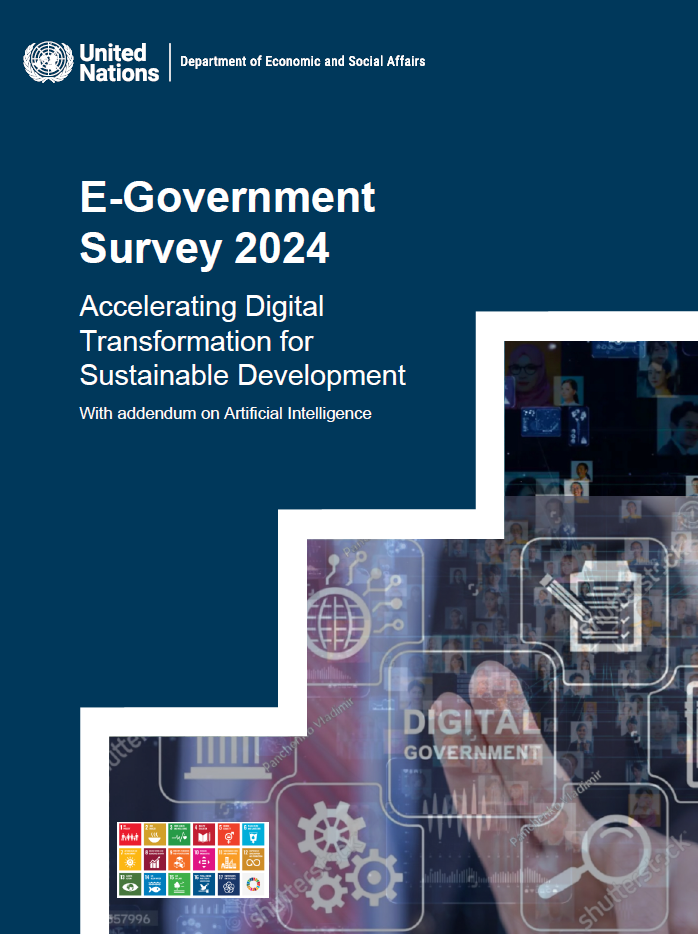Exploring the Vital Role of E-Government in Advancing Sustainable Development Goals
UN DESA
Session 350
United Nations E-Government Survey 2024
This facilitation meeting will explore how e-government can be leveraged to achieve the Sustainable Development Goals (SDGs) . Participants will have the opportunity to:
- Learn more about the upcoming United Nations E-Government Survey 2024
- Share best practices and lessons learned on e-government.
- Learn from UN Agencies latest developments on e-government.
- Foster collaboration among stakeholders to facilitate knowledge sharing and effective implementation strategies.
This session is open to all UN Member States to share their latest developments on e-government.

Giacomo Mazzone is a seasoned media manager with 40 years of experience in news, sports, and international relations. Trained as a journalist, he has held significant roles at RAI, Euronews, Eurosport, and the European Broadcasting Union (EBU). Mazzone has expertise in European and multilateral negotiations, contributing to the UNESCO Cultural Diversity convention in 2005. His career highlights include founding Euronews, directing European Affairs, creating RAI's all-news channel, and leading international relations at RAI. Currently, he serves on the Advisory Board of the European Digital Media Observatory and holds various advisory roles with the EU, Council of Europe, Vatican Foundation CAPP, and the UN. He is also Secretary General of Eurovisioni and a board member of EuroDIG and IGF Italy.
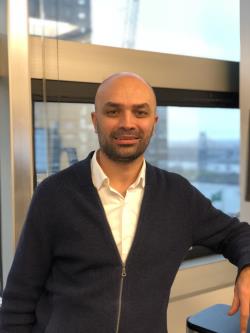
Deniz Susar is a Governance and Public Administration Officer, Digital Government Branch, Division for Public Institutions and Digital Government is a Governance and Public Administration Officer at the Division for Public Institutions and Digital Government of UNDESA. Deniz’s main work areas include digital government and preparation of the biannual UNDESA flagship publication ‘United Nations E-Government Survey'. As part of his current role, he also supports the Internet Governance Forum (IGF). His main research areas include e-government, open government, citizen engagement, internet governance, artificial intelligence and other frontier technologies and open government data. Deniz holds a Master Degree on International Political Economy and Development from Fordham University, New York, United States and a Computer Engineering degree from the Bosphorus University of Istanbul, Turkey.
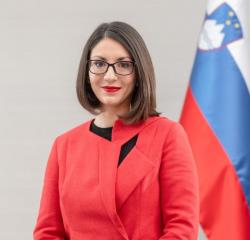
Dr. Emilija Stojmenova completed her undergraduate and postgraduate studies at the University of Maribor's Faculty of Electrical Engineering, Computer Science, and Informatics. After graduation, she worked as a young business researcher at Iskratel and later joined the University of Ljubljana, where she is an Associate Professor in the Department of Information and Communication Technologies and managed the 4PDIH Digital Innovation Hub. She has held several leadership roles, including Executive Director of the Digital Innovation Hub Slovenia and Director of RAZ:UM. Dr. Stojmenova Duh has coordinated numerous national and international research projects on digital technologies and has contributed to several European Commission thematic groups. An advocate for women in engineering, she was the first President of IEEE's "Women in Engineering Slovenia" and participated in the #HiddenNoMore programme. She was a finalist for "2018 Woman Engineer of the Year" in Slovenia and a nominee for Slovenian Woman of the Year 2021. Additionally, she is the first Slovenian woman representative at the Global Young Academy and has been involved with the Slovenian Research Agency, Employment Service of Slovenia, and Forum Synergies.
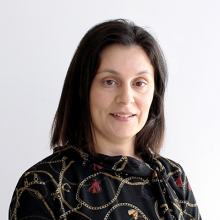
Delfina Soares is the Director of the United Nations University Operating Unit on Policy Driven Electronic Governance (UNU-EGOV). Delfina has been associated with the Operating Unit since 2015, when she joined as Adjunct Associate Professor. She has strong ties to UNU-EGOV’s host university, the University of Minho, where she has held various positions over the past 18 years, including Lecturer and Assistant Professor at the Department of Information Systems and as a Researcher with Centro ALGORITMI.
She holds a PhD in Information Systems and Technologies and a MSc in Informatics, both from the University of Minho. Her areas of research and expertise include electronic governance at a national, local and sectorial level, electronic government interoperability and cross-agency collaboration, electronic democracy and electronic participation, and electronic governance measurement and monitoring. She has been member of organizational, programme and scientific committees of multiple conferences, tracks and workshops in the Information Systems and Technology (IST) area and, particularly, in the e-Governance area. Delfina has also participated and supervised national and international research projects in the area of IST in governance, and delivered talks, seminars, and presentations on the theme of e-Governance to postgraduate students and to public administration practitioners.

Mr Nathan Menton is a statistician in the ICT Data and Analytics Division of the International Telecommunication Union (ITU) Telecommunication Development Bureau where he focuses on the measurement of ICT indicators through household surveys. His work includes managing ICT data collection through country questionnaires and developing statistical models to estimate key ICT indicators such as individual Internet use and mobile phone ownership. Before joining ITU, Nathan worked as a statistician with the UN Economic Commission for Europe and the UN Statistical Division where he coordinated international data collection and analysis on transport, demography, and national accounts at various points. Nathan holds a master’s degree in statistical science from George Mason University.
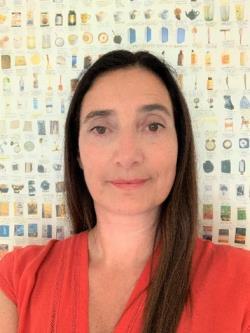
Maria is an Employment and Future of Work Specialist in the ILO’s Employment Policy Department (EMPLOYMENT/EMPLAB). In her current position, she works on the interrelated strategic topics of employment policies, youth employment and digitalization and coordinates the ILO's Inter-Departmental Action Group on Youth Employment. Maria has more than twenty years of professional experience in the United Nations (ILO and UNDP) in positions that included thematic areas such as employment policies, youth employment, digitalisation, local economic and social development, urban development, small and micro enterprise development, the informal economy, and infrastructure development.
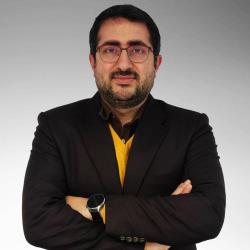
Hossein Mirzapour is a thinker, lecturer, and policy entrepreneur. For more than 20 years, he has been studying, researching, and working on different aspects of policymaking and particularly reforms through public-private partnerships. Having received his engineering degree at Sharif University, he moved to Paris to pursue his MSc in Economics & Corporate Management at IFP School. Later, he left Renault Co to return to the Middle East and participate in projects about the emerging reforms of local markets, such as the privatization of Iranian state-owned energy companies. That allowed him to co-found Sharif Policy Research Institute (SPRI) at Sharif University. He served as the deputy director at SPRI until he started the joint Ph.D. program of administration at the University of Montreal, HEC School of Business. He is the founder of Data for Governance Lab (D4GLab), where young talents challenge themselves to educate top local decision-makers on value extraction from big data as the new oil.
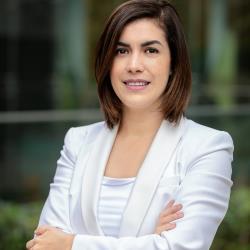
Yolanda Martínez is a Digital Development Expert currently serving as the overall lead of the GovStack Initiative at the International Telecommunications Union where she collaborates with governments in accelerating the digital transformation of their services using standard-based, reusable digital public infrastructure/building blocks. Within the public domain, Yolanda spearheaded Mexico’s National Digital Strategy, oversaw the Digital Government Unit at the Federal Level, and directed the Zapopan Digital City Program at the municipal level. In the private sector, while at Deloitte Consulting, she championed numerous digital transformation projects. On the international front, Yolanda headed the Office of the Inter-American Development Bank (IDB) in Chile. She partnered with United Nations agencies and the OECD to peer review the digital government strategies across various Latin American countries. @political has recognized Yolanda as one of the top twenty most influential people in digital government. She earned her Ph.D. in information and knowledge society from the Open University of Catalonia (UOC) and her Master’s from Carnegie Mellon University.
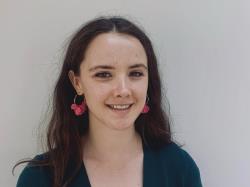
Angelica Zundel is a consultant specializing in digital government and decentralization in the public sector. Angelica’s main work areas include developing digital toolkits and capacity-building programs for local governments. Her main research areas include e-government, digital transformation, and sustainable development. Angelica holds a Master's in Public and Nonprofit Policy and Management from New York University and a Master's in Innovation, Human Development, and Sustainability from the University of Geneva.
-
 C7. ICT applications: benefits in all aspects of life — E-government
C7. ICT applications: benefits in all aspects of life — E-government
